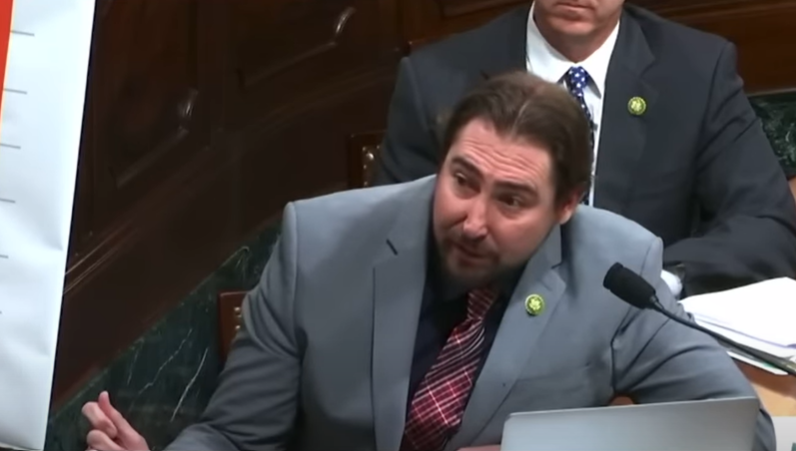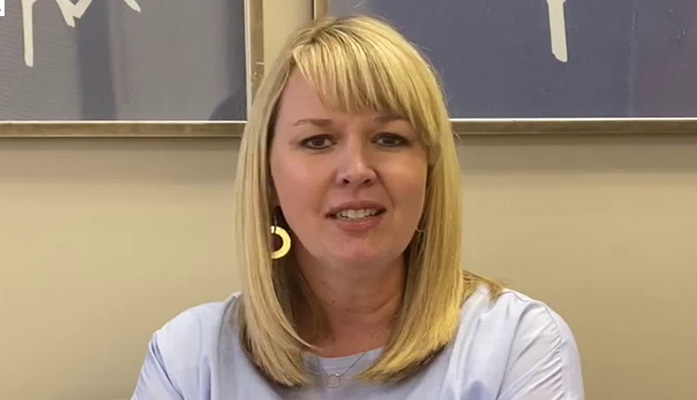
by Matthew Holloway | Nov 1, 2025 | News
By Matthew Holloway |
Arizona Senator Ruben Gallego sharply criticized Republican leaders over the Democrat-led federal government shutdown during an appearance on CBS’s The Late Show with Stephen Colbert this week. Gallego claimed that the impasse threatens health care affordability nationwide
The segment spotlighted the Democrat-instigated federal government shutdown and the looming expiration of enhanced Affordable Care Act (ACA) subsidies, which could drive up premiums as open enrollment begins November 1st. The interview played out like an in-kind political ad for Gallego.
The subsidies, extended under the 2021 American Rescue Plan as a form of COVID relief, eliminated income caps for marketplace eligibility, allowing households above 400% of the federal poverty level to receive aid.
Host Stephen Colbert teed up the Democratic position for the softball interview: “Well, this shutdown has gone on for 29 days. If I can characterize the position the Democrats want the Republicans to address [as] the lapsing of the tax credits and ACA, the Obamacare, so people are going to see the rates jump up starting in November, right?”
Gallego detailed the stakes for his state. He noted that premiums could surge nearly 50% for a family of four earning up to $128,600 annually—or a family of five up to $150,600—potentially adding about $7,000 to yearly costs. He said, “And things are hard right now. I mean, everything is fricking expensive, and now the government, these Republicans, are going to willingly raise people’s premiums. That’s what’s happening right now.”
The senator, who has continued to cash his congressional paychecks during the shutdown, directed fire at GOP figures absent from negotiations. He accused House Speaker Mike Johnson of being “off hiding somewhere with the Epstein list” and quipped about former President Donald Trump, saying, “I don’t know where the hell Trump is. But I think he’s probably in Korea putting on a crown or something like that.”
Gallego stressed the fallout for ordinary Americans: “Either way, our people, everyday working-class people in this country are hurting right now.”
Just two weeks ago, Gallego claimed he needed to “restrain” himself in the presence of Speaker Johnson when he and Sen. Mark Kelly confronted the Speaker in a Capitol hallway.
Gallego’s account seems to ignore a point that Senate Majority Leader John Thune exposed explosively from the Senate floor Monday night when he said, “The senator from New Mexico is absolutely right; SNAP recipients shouldn’t go without food. People should be getting paid in this country, and we’ve tried to do that 13 times—and you voted no 13 times! This isn’t a political game; these are real people’s lives we are talking about, and you have all just figured out 29 days in that, oh, there may be some consequences?!?”
Instead, Gallego took the time to leverage his well-worn rags-to-Senate story—from a single-mother home to advocating for economic opportunity —continuing what appears to be a soft start to 2028 White House ambitions.
Arizona State Representative Nick Kupper (R-LD25) took to X to respond to Gallego’s post, sharing the interview. Gallego wrote, “The fact that someone like me ended up where I am is proof that this country can still be great. But that promise doesn’t survive on its own. We have to fight for it.”
Kupper, seemingly unimpressed, reposted him, quipping: “The fact that he’s on this late-night show slinging his crap is more proof that this is all just performance art.”
The full interview is available on YouTube and Paramount+.
Matthew Holloway is a senior reporter for AZ Free News. Follow him on X for his latest stories, or email tips to Matthew@azfreenews.com.

by Matthew Holloway | Oct 31, 2025 | News
By Matthew Holloway |
U.S. Congressman Eli Crane (R-AZ02) announced his election as Chair of the Congressional Justice for Warriors Caucus (CJWC) this week.
Crane is a former U.S. Navy Seal with multiple combat deployments in the Middle East. The CJWC, established in 2019, focuses on addressing injustices faced by service members and veterans, including wrongful convictions, flawed military investigations, and nonjudicial punishments.
The caucus has secured clemency, parole, and pardons for affected individuals, while advocating for improved medical care, correction of records, and accountability from the Department of Defense and Department of Veterans Affairs for unmet congressional mandates.
The group also works to reform aspects of military law, such as the Uniform Code of Military Justice and Rules for Courts-Martial, to protect against unlawful command influence, prosecutorial misconduct, and misapplication of rules.
“I’m honored to serve as Chairman of the Congressional Justice for Warriors Caucus, which does vital work on behalf of our military community,” Crane said in a statement. “I encourage any veteran who believes they’ve been wrongfully persecuted to reach out. We’re here to help.”
Posting the announcement to X, Crane wrote, “This Congress, I’m honored to chair the Congressional Justice for Warriors Caucus. Since 2019, the Caucus has delivered positive outcomes for our military community. If you are a veteran who believes you have been wrongfully persecuted, please reach out.”
Crane will be joined by Rep. Daniel Webster (R-FL) as Executive Member, along with Reps. Eric Burlison (R-MO) and Cory Mills (R-FL). Veterans or those with relevant cases can submit information through the caucus website.
The caucus advised that for veterans to streamline their inquiries, they should be prepared to provide:
- VA claim number for a case with the Department of Veterans Affairs;
- Charge sheet from either DOW or civilian court that you are seeking assistance with;
- A timeline of events in chronological order;
- Any pertinent and concise letters of support from witnesses of the event;
- Both the government’s and the defense’s appellant briefs in PDF format, with relevant portions highlighted to support your argument and theirs; and
- Your address and phone number so that we can contact you.”
Matthew Holloway is a senior reporter for AZ Free News. Follow him on X for his latest stories, or email tips to Matthew@azfreenews.com.

by Matthew Holloway | Oct 30, 2025 | Education, News
By Matthew Holloway |
The Phoenix Union High School District (PXU) is preparing for significant budget reductions and potential staff layoffs as enrollment continues to drop, according to a letter sent to district employees on October 24th by Superintendent Thea Andrade.
In a letter to PXU colleagues posted to X by Phoenix Union Governing Board Member Jeremiah Cota, Andrade cites a decline of approximately 1,800 students in the 2025-2026 school year, following a drop of about 1,200 students the previous year. This represents a total loss of roughly 3,000 students, or about 10% of the district’s overall population, since its high point in 2022.
The superintendent attributes the budget cuts to “a significant decline in student enrollment.” In her letter, she explains that “the reasons for declining enrollment are complex,” and pivots to what she says are contributing factors: “the largest expansion of Empowerment Scholarship Accounts (ESA) in our state’s history,” the continued growth of charter schools, local demographic challenges such as gentrification and low birth rates, and the expiration of several federal Elementary and Secondary School Emergency Relief (ESSER) funds.
The announcement drew immediate response from Governing Board Member Jeremiah Cota, who slammed the district for casting blame on ESA families, charter schools, and Arizona’s Republican-led legislature.
In his post, Cota said that as a board member, he has repeatedly requested improvements in school safety and has been “all but ignored.” He also expressed concern that parents are hesitant to send children to district schools due to safety issues and “woke identity politics” in classrooms.
Cota wrote in full:
“Today, Phoenix Union High School District announced an untold number of possible job cuts due to declining enrollment.
It’s unfortunate, this district has chosen to blame ESA families, charter schools, and the GOP legislature for their budget shortfalls.
As a board member for @PhoenixUnion, from day one I’ve asked to make our schools safer and have all but been ignored on EVERY single request.
Parents, don’t feel safe sending their kids to one of our schools and are tired of the woke identity politics being injected in the classroom.
Yet, here we are, big enrollment drops and possibly even bigger job cuts coming.
TRUTHFULLY, I am concerned the present board will not take any corrective action to stem this decline.”
To address the financial strain, the district has already implemented cuts. In the 2023-2024 school year, it reduced district office budgets by $8.6 million and reorganized the executive team, eliminating several administrative positions to shield campus roles. For the 2024-2025 school year, per AZ Family, an additional $5.8 million was cut through district office reductions, unfilled vacancies, and natural attrition.
As previously reported by AZ Free News, the Phoenix Union High School District (PXU) faced major controversy going into a vote to approve a Memorandum of Understanding (MOU) with Chicanos Por La Causa (CPLC) to provide substance abuse prevention and mental health services at three high schools. The MOU outlines CPLC’s role as a subgrantee of the Arizona Health Care Cost Containment System (AHCCCS) under the federal Substance Abuse Prevention and Treatment Block Grant (SABG).
The MOU would also permit CPLC to offer “Health Masculinity Services for Self-Identified Males.”
Looking ahead, the district projects it will need to cut another $15 million in the 2025-2026 school year and $20 million in the 2026-2027 school year to maintain solvency. Approximately 90% of the district’s annual budget goes toward employee salaries and benefits, Andrade noted.
Matthew Holloway is a senior reporter for AZ Free News. Follow him on X for his latest stories, or email tips to Matthew@azfreenews.com.

by Matthew Holloway | Oct 29, 2025 | News
By Matthew Holloway |
Recent filings show Mesa City Councilwoman Julie Spilsbury raising $94,207 for her November 4 recall defense, including several Democratic donors and aligned figures.
Spilsbury, a two-term council member, entered the reporting period with a remaining balance of $1,631 from January filings before piling on over $90k in donations. Her total raised now exceeds her 2023 re-election campaign by nearly $30,000. She has reportedly spent $32,866 during the period, including $28,700 on consultant services.
Among Spilsbury’s donors are Tim Stringham, a Tempe Navy veteran and unsuccessful Democratic candidate for Maricopa County Recorder; Jennifer Pawlik, former Chandler Democratic state representative; and other individuals with Democratic ties.
Stringham contributed an unspecified amount, Pawlik gave $100, and former Maricopa County Recorder Stephen Richer gave $1,000, as reported by The Mesa Tribune.
Spilsbury also received $1,500 from the John Giles for Mayor Committee. Giles served as Mesa mayor for a decade before leaving office in January 2024 and has vocally supported both former President Joe Biden and former Vice President Kamala Harris in their presidential campaigns.
In addition to the others named, Councilwoman Spilsbury’s donor list includes: Colleen Wheeler, a Mesa healthcare executive ($4,250); Yasser Sanchez, a Gilbert immigration attorney ($3,500); David Johnson, a Mesa real estate broker ($2,500); David Stahle, a Mesa financial consultant ($2,500); Mary “Marcie” Hutchinson, Mesa Public Schools Governing Board member ($1,000); Stan Barnes, Mesa Republican political consultant ($500); Sean Lake, Mesa land-use attorney ($500); Dennis Kavanaugh, former Mesa councilman ($100); Dr. Andi Fourlis, former Mesa Public Schools superintendent ($100); Lacy Chaffee, Mesa Public Schools Governing Board member ($100); and Richard Humpherys, husband of Gilbert Public Schools Governing Board member Jill Humpherys ($50).
The councilwoman also received $17,300 from political action committees, including $6,750 from United Mesa Firefighters, $6,750 from Moms Fed Up, and $2,500 from Country First.
Taylor, a political newcomer, reported expenditures of $5,717, including $4,072 to Mesa Sign Shop and $900 to Moir & Associates for consulting.
Taylor’s donors include: Earl Taylor, a Mesa retiree and founder of Heritage Academy charter school ($3,200); Scott Grainger, a Mesa forensic engineer ($2,000); David Winstanley, a Mesa retiree ($1,042); David Cummard, a Mesa insurance CEO ($1,000); Joseph Hughes, a Gilbert retiree ($1,000); and Melody Whetstone, who ran against Spilsbury in the 2023 primary ($105).
Taylor received $5,500 from PACs, including $5,000 from the Arizona Free Enterprise Club’s Freedom Club and $500 from the Home Builders Association of Central Arizona.
The recall petition, initiated by a resident with assistance from Turning Point USA, gathered 5,235 signatures, of which Maricopa County verified 3,858. The petition accuses Spilsbury of using her office to advance private interests, citing her votes in favor of a temporary homeless shelter in District 2, a council pay raise, and increases in residential and commercial utility rates. The shelter vote passed 4-3; the pay raise and utility rate increases passed unanimously 7-0.
Spilsbury’s support for an anti-discrimination ordinance extending protections to groups, including gender identity, has also been referenced in the recall effort. Taylor has connected Spilsbury’s shelter vote to homelessness issues in Mesa.
In December 2023, residents at a council meeting criticized Spilsbury and former Mayor John Giles for supporting Vice President Kamala Harris and other Democratic candidates in the presidential election. The Republican committees of Legislative Districts 9 and 10 passed resolutions censuring Spilsbury for campaigning on behalf of multiple Democrats.
In the July 2023 primary for District 2, Spilsbury received 8,120 votes, or 65.91%, out of 12,322 total votes cast. District 2 has 49,329 registered voters, according to the Mesa City Clerk.
Spilsbury and her supporters have canvassed neighborhoods every Saturday since early September. Taylor has conducted door-to-door outreach and met with voters in the district.
The city estimates the special election will cost at least $104,577. The winner will take office the day after the vote count. If Spilsbury retains her seat, she will serve through January 2029; if Taylor wins, she will complete the remainder of the term.
Matthew Holloway is a senior reporter for AZ Free News. Follow him on X for his latest stories, or email tips to Matthew@azfreenews.com.

by Matthew Holloway | Oct 27, 2025 | News
By Matthew Holloway |
U.S. Rep. Eli Crane (R-AZ02) led a bipartisan group of Arizona lawmakers in sending a letter to the National Park Service (NPS) last week, requesting $28.36 million to upgrade aging water infrastructure serving Page and surrounding communities.
The funding, sought under the Great American Outdoors Act (GAOA), would rehabilitate systems managed by Page Utility Enterprises (PUE) that supply water to Page, nearby Navajo Nation areas, and the Glen Canyon National Recreation Area. Cosigners on the letter addressed to Acting NPS Director Jessica Bowron included Reps. Andy Biggs (R-AZ), Paul Gosar (R-AZ), and Greg Stanton (D-AZ).
In a post to X, Crane wrote, “Despite the ongoing shutdown, my team and I remain focused on #AZ02. Yesterday, we urged @NatlParkService to help upgrade the water delivery system serving Page and nearby communities that serve as a gateway to the North Rim of the Grand Canyon.”
The current aging infrastructure, over 60 years old, includes a 12-inch intake pipeline through Glen Canyon Dam that is undersized and vulnerable to fluctuations in Lake Powell’s water levels, according to the letter. Peak seasonal demand often exceeds capacity, and if lake levels drop below the intake level, PUE could lose the ability to deliver water to customers.
Recent wildfires, including the Dragon Bravo and White Sage fires, have burned thousands of acres in northern Arizona, further straining the drought-impacted region and highlighting the need for long-term solutions, the lawmakers wrote.
The proposed project would involve installing a new water intake and pump station on the south side of Lake Powell, along with an 18-inch replacement pipeline. This would double daily delivery capacity from 3.3 million gallons to 6.6 million gallons.
The GAOA, enacted in 2020, provides up to $1.3 billion annually through 2025 for public lands infrastructure and recreation access. The representatives noted that the Page project aligns with the program’s goals and should be prioritized if remaining funds are available or if the act is reauthorized.
“I’m proud to lead this bipartisan letter to ensure Page and surrounding communities have reliable water delivery infrastructure,” Crane said in a statement.
“With the Dragon Bravo and White Sage fires devastating the region, we must do more for what is a critical gateway to the North Rim of the Grand Canyon. I’m grateful to Reps. Stanton, Gosar, and Biggs for joining this effort, and we will continue pushing for a positive outcome.”
The bipartisan letter from the Arizona congressmen emphasized the project’s role in supporting public health, economic stability, and tourism in the region, which relies heavily on the national recreation area.
Matthew Holloway is a senior reporter for AZ Free News. Follow him on X for his latest stories, or email tips to Matthew@azfreenews.com.





